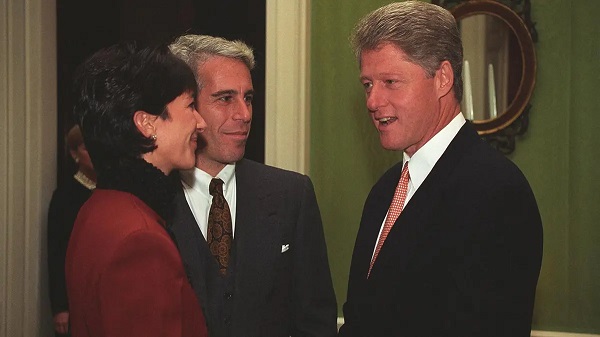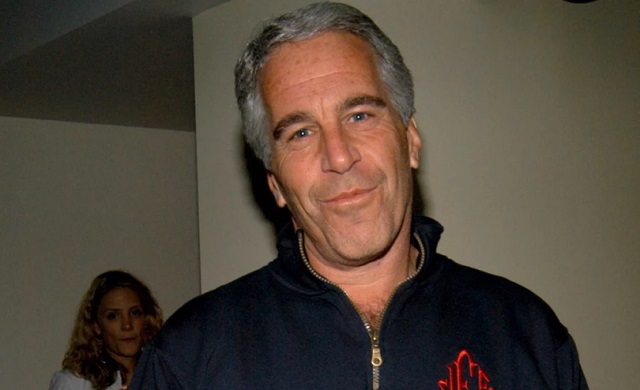espionage
Ghislaine Maxwell Proffer: A Daughter Acknowledges Her Father’s Espionage Shadows but Denies Epstein’s Sex-Blackmail Op Rumors

In July 2025, inside a sealed Justice Department conference room in Tallahassee, Ghislaine Maxwell spoke at length about her life with Jeffrey Epstein. Across two days of questioning, she confronted the themes that now shadow the American administration and some of the world’s most powerful men: was her father, Robert Maxwell, the root of a sprawling intelligence operation—one that extended through his daughter’s relationship with the mysteriously wealthy Epstein and reached leaders from Prince Andrew to Bill Clinton and even Donald Trump?
The session was not a cooperation deal or plea bargain but a proffer under limited immunity. Prosecutors could impeach Maxwell if she later contradicted herself.

Maxwell sat with her lawyers. Across the table were Deputy Attorney General Todd Blanche, FBI Special Agent Spencer Horn, and Deputy U.S. Marshal Mark Beard. Their questions probed Epstein’s fortune, his circle of elites, the persistent intelligence rumors, and his death.
On Friday afternoon, the Justice Department released hundreds of pages of partially redacted transcripts and audio recordings from the interviews. The White House presented this as a gesture of transparency amid backlash from Trump’s base and criticism from Democrats. The redactions, though extensive in places, still allowed readers to follow the central exchanges.
The closest Maxwell came to portraying Epstein as involved in anything “covert” or “nefarious” was in a curious recollection: “He showed me a photograph of himself with African warlords… He said he was in the business of finding stolen money for billionaires. He would take a percentage of what he recovered.”
Did Maxwell—who has already been convicted of perjury—lie again to shield powerful friends?
One exchange, centering on perhaps the most notorious and publicly recognized piece of evidence in the Epstein saga, suggests she may have.
Blanche: “The photograph of Prince Andrew with Virginia Giuffre has been described as one of the most consequential pieces of evidence. How do you respond?”
Maxwell: “It’s manufactured. Literally a fake photo. My London flat was too small to host such an encounter, and the date on the back doesn’t match flight logs. My friendship with Andrew made him trust Epstein more, but I had nothing to do with that picture.”
On Robert Maxwell and Intelligence
Blanche: “With respect to your father, there have been multiple questions about whether he worked for any intelligence agency. Do you have any knowledge about that?”
Maxwell: “I think—well certainly my father had a background in intelligence… I believe he did in the second World War. He was… a British intelligence officer. I think that… once you’ve been an intelligence officer, you’re kind of—always; it doesn’t mean that you’re formally employed.”
She added she had “no formal knowledge” of specific activities, but believed he “did help people.”
On whether Robert Maxwell ever introduced her to Epstein, she was emphatic: “They never met… I know they never met.” She said her father vetted Epstein through Bear Stearns leaders “Jimmy Cayne and… Ace Greenberg.”
Maxwell’s words were cautious, but telling. She essentially confirmed what intelligence veterans often describe: once active in that world, many never fully leave. By her account, her father lived as a businessman and politician but remained an informal node in intelligence—“trading business or ideas” with powerful people and institutions.
This amounts to an acknowledgment: Robert Maxwell lived and died inside the world of intelligence. His role as publisher, financier, and political broker likely made him a valuable cutout, and that was likely a profitable arrangement for his family. Plausible reporting over decades has strongly supported ties to MI6 and Mossad. The most persistent allegations involve the sale of bugged PROMIS software to U.S. government agencies on behalf of Israel’s Mossad, and financial dealings with Soviet bloc actors. None of these claims have been proven in court. But the limited comments of Ghislaine Maxwell suggest she knew her father’s business well.
On Epstein, Mossad, CIA, and the FBI
Blanche: “Have you ever had any contact… from Mossad…?”
Maxwell: “Well, not deliberately… Not deliberately.”
Blanche: “Did you ever think that Mr. Epstein was getting any money from any intelligence agency, including Mossad?”
Maxwell: “Well, I don’t believe so, but I wouldn’t know. I mean, I would be very surprised if he did. I don’t think so. No.”
Horn: “CIA? DIA?”
Maxwell: “I don’t think so. I just don’t think he had the wherewithal, and I think that whole aspect is bullshit.”
Her denials stand in contrast with reasonably credible, though not court-validated, media reporting. In 2019, journalist Vicky Ward reported in The Daily Beast that a former White House official said they had heard Alexander Acosta—then U.S. Attorney for the Southern District of Florida, who handled Epstein’s 2007 plea deal at the end of the George W. Bush presidency—tell Trump transition interviewers in 2017: “I was told Epstein ‘belonged to intelligence’ and to ‘leave it alone,’” adding that Epstein was “above his pay grade.”
Epstein’s Suspicious Wealth
Blanche: “How did Epstein make his money?”
Maxwell: “He started as a math teacher at Dalton. From there he was hired by Bear Stearns… At Bear Stearns, he developed some new type of trading system—a trading vehicle. Then, after a disagreement, he left. That’s when he said he was in the business of finding stolen money for billionaires. He would take a percentage of what he recovered. But I was not part of his business world, except tangentially.”
She identified “very important clients”: Les Wexner—for whom Epstein “structured or restructured The Limited,” handled “his entire personal finances,” and “all of the investment strategy” (she speculated the 71st-Street townhouse, the vast Upper East Side mansion that became Epstein’s New York base, factored into compensation); Leon Black—“the same as what he did for Wexner”; another connected female in their circle provided the—“same help in business,” and even “contracts for the maids”; and there was an unnamed wealthy Ohio woman with “the largest Klein painting.”
Rumors have long swirled that Epstein’s fortune was less about finance and more about leverage — that his friendships with billionaires, politicians, and world leaders provided opportunities for kompromat, even blackmail. Investigators, journalists, and critics have speculated that his homes may have doubled as “honey traps,” recording powerful men in compromising situations to secure influence.
On blackmail: “Never. No… I thought he was a legitimate businessman, very conscientious, very good at math.”
On Clinton, Trump, Barak, and Movie Stars
Blanche: “You’ve been named on flight logs with President Clinton. How would you describe his relationship with Mr. Epstein?”
Maxwell: “President Clinton was my friend. Not Epstein’s… Clinton traveled on Epstein’s plane twenty-six times, or whatever the flight logs say. I was there. He never received a massage. I never saw anything improper.”
Blanche: “Did you ever see Mr. Clinton participate in massages or any improper behavior with young women?”
Maxwell: “No. Never. I was there. He never received a massage. I never saw anything improper.”
On specifics, she described joint travel:
- Cuba, where she said Clinton met Fidel Castro.
- Italy, a Vatican visit with Clinton aide Mark Middleton and Middleton’s wife to see Henry VIII’s divorce documents.
- Africa, where Clinton flew with Chris Tucker and Kevin Spacey aboard Epstein’s jet.
She also volunteered: “I was very central in the ramp-up [of] the Clinton Global Initiative” and suggested Epstein “may have helped me help them” financially—without details.
Blanche: “What about Donald Trump? Your name and his are often linked through Epstein.”
Maxwell: “My father knew Trump. I admired him… Trump was never inappropriate with anybody. Never.”
Blanche: “Did you ever see Mr. Trump at Epstein’s homes or on his planes?”
Maxwell: “No. I never saw anything like that. I never saw him in any improper context with Epstein.”
Horn: “We’ve seen reports of Epstein’s relationship with Ehud Barak. Given your father’s deep ties to Israel, what was your impression of that connection?”
Maxwell: “I can think of Ehud Barak, yes. But I don’t know the details of their relationship. My father loved Israel, so I pay attention to it. We have ties to Israel. But I can’t tell you more.”
On the “Black Book”
Blanche: “Was there a client list? A black book of names?”
Maxwell: “There is no list. We’ll start with that… Nothing like that.”
On Epstein’s Prison Death
Maxwell said she does not believe Epstein killed himself, but also rejected the idea that he was silenced to protect powerful figures.
“I do not believe he died by suicide, no,” Maxwell said.
When asked if she had any theory about who might have killed him, she replied, “I don’t.” Pressed further on whether she thought Epstein was murdered to “keep him quiet” because he had information about “rich and powerful people,” she answered, “I do not have any reason to believe that.”
“And I also think it’s ludicrous,” she added, noting that if such people had wanted him dead, “they would’ve had plenty of opportunity when he wasn’t in jail.”
The Bureau is a reader-supported publication.
To receive new posts and support my work, consider becoming a free or paid subscriber.
espionage
Soros family has been working with State Department for 50 years, WikiLeaks shows

From LifeSiteNews
Files from State Department officials as early as the 1970s show the US government helping the family of radical leftist financier George Soros secure deals and funding.
The U.S. State Department has been working with the Soros family for at least 50 years, Mike Benz demonstrated using diplomatic cables published to Wikileaks.
Benz, a former deputy assistant secretary at the U.S. State Department, explained in a video posted to X on Sunday that he searched for the terms “Soros” and “Open Society Foundation,” which was created by Soros, in Wikileaks’ collection of diplomatic cables. His goal was to “create a comprehensive tapestry of all U.S. state department involvement with Soros and the Open Society Foundation in every country in the world.”
The former state department official, now the executive director of the Foundation for Freedom Online, wanted to document why it was said that George Soros is treated by the U.S. like an “independent entity” akin to a country.
In a 1995 piece published by The New Yorker, former U.S. Ambassador to Turkey Morton Abramowitz said of Soros, “he’s the only man in the US who has his own foreign policy — and can implement it.”
Strobe Tallbott, former deputy secretary of state, also said of the far-left financier, “It’s like working with a friendly, allied, independent entity, if not a government. We try to synchronize our approach to the former Communist countries with Germany, France, Great Britain — and with George Soros.” This he “added with a grin,” wrote Connie Bruck.
Benz reviewed key cables from State Department officials as far back as the 1970s demonstrating the U.S. government’s involvement with the Soros family in what appeared to be a quid pro quo relationship.
In one 1976 cable from former U.S. Secretary of State Henry Kissinger, it was shown that the Brown & Root (now Halliburton), a CIA-linked company known for work on military installations and off-shore drilling platforms, wanted to “go all out” for the construction of a port in Santa Clara, Gabon, a country on the west coast of Africa.
It is noteworthy that Brown & Root’s co-founder Herman Brown was granted a covert security clearance for work with the CIA in 1953 “for use as a covert associate.” As of the 2000s, the company was one of George Soros’ top five holdings, Benz showed.
Referencing Brown & Root’s Manager of International Sales, Kissinger wrote, “O’Sullivan has just come from detailed discussions with Soros Associates to develop background for on-site estimates of construction timetable and costs … to be used in forthcoming talks with Gabon officials.”
Soros Associates, Benz explained, was run by George Soros’ older brother Paul Soros, now deceased.
The cable, addressed to the U.S. Embassy in Gabon, seemed to pressure assistance for the construction of this port, noting that while the request for help with it came at a “difficult time,” “strong interest” in the project and other reasons “preclud[ed] deferral.”
Another series of messages show that the U.S. Department helped the Soros family to secure a contract for the port in Gabon.
According to one cable, the director of the Santa Clara port, named as “Damas,” “said that meetings had been held within the Government of Gabon and were continuing which should lead shortly to the elimination of all but a few offers and that Soros was in a very good position.”
Benz remarked, “Here is the head of the State Department in Gabon backchanneling with the head of the port to make sure that Paul Soros won the bid. Eliminate all of the opposition.”
Another message read, “It appears Soros Associates virtually certain to get engineering contract for Port.”
“Not only is the US State Department negotiating Soros’ deals, helping him secure the deals. They’re also backchanneling so that foreign governments can pay [S]oros so that Soros makes his appropriate profit on the deal,” remarked Benz.
“There is this favors-for-favors relationship that goes back five decades, And those are just the earliest cables we have,” he added.
The exposure of these cables has been described as an “ultra massive find” by journalist Alex Jones.
The find is massive because George Soros himself, as was admitted by Morton Abramowitz and Strobe Tallbott, has foreign policy interests independent of the U.S. and over the past decades has demonstrated influence on U.S. domestic policy in favor of an impotent justice system, internet censorship, and a wide range of left-wing causes such as abortion, euthanasia, and population control, as well as homosexual “marriage,” and transgenderism. In other words, as some commentators have put it, his impact has been to erode the moral fabric of America and weaken the country.
espionage
Trump: “I HAVE JUST SIGNED THE BILL TO RELEASE THE EPSTEIN FILES!”

President Trump moved Wednesday to end years of secrecy surrounding one of the nation’s most notorious scandals, signing legislation that compels the Department of Justice to hand Congress virtually every scrap of material tied to Jeffrey Epstein. The president announced the move on Truth Social, writing, “I HAVE JUST SIGNED THE BILL TO RELEASE THE EPSTEIN FILES!”
Trump reminded supporters that he personally pressed House Speaker Mike Johnson and Senate Majority Leader John Thune to fast-track the legislation. “Because of this request, the votes were almost unanimous in favor of passage,” he wrote, pointing to the rare level of bipartisan agreement behind a bill that forces unprecedented transparency. The Epstein Files Transparency Act requires the DOJ to deliver all unclassified records — and as much classified material as possible — to Congress within 30 days. It also directs Attorney General Pam Bondi to provide lawmakers with a list of government officials and other “politically exposed persons” tied to Epstein within just 15 days.
The measure sailed through the House in a staggering 427–1 vote Tuesday before clearing the Senate unanimously. Its path to passage wasn’t always straightforward. For months, the Trump administration had sparred with lawmakers pushing for the release, with the president often calling the frenzy around “Epstein files” a Democrat-driven hoax designed to smear him.
In his Truth Social post, Trump leaned into the history, reminding Americans that Epstein “was charged by the Trump Justice Department in 2019 (Not the Democrats!)” and that the disgraced financier “was a lifelong Democrat” who poured money into Democrat campaigns. The president also pointed to Epstein’s well-documented relationships with high-profile Democrats, listing figures such as Bill Clinton — “who traveled on his plane 26 times” — former Treasury Secretary Larry Summers, activist billionaire Reid Hoffman, House Minority Leader Hakeem Jeffries, and Delegate Stacey Plaskett. “Perhaps the truth about these Democrats, and their associations with Jeffrey Epstein, will soon be revealed,” Trump wrote.
He added that the DOJ, under his direction, has already provided Congress nearly 50,000 pages of Epstein-related material — a stark contrast, he said, to the Biden administration, which “did not turn over a SINGLE file or page related to Democrat Epstein, nor did they ever even speak about him.”
For Trump, the transparency push is as much about exposing what Democrats don’t want voters to see as it is about delivering documents. He argued that the left had leaned on “the ‘Epstein’ issue” to distract from the “AMAZING Victories” of his administration. Now, with the bill signed and agencies under a firm deadline, he predicted the political tables are about to turn.
“This latest Hoax will backfire on the Democrats just as all of the rest have!” he wrote — a warning, and a promise, as Washington braces for whatever the next 30 days will reveal.
-

 Artificial Intelligence2 days ago
Artificial Intelligence2 days ago‘Trouble in Toyland’ report sounds alarm on AI toys
-

 Business14 hours ago
Business14 hours agoRecent price declines don’t solve Toronto’s housing affordability crisis
-

 Bruce Dowbiggin1 day ago
Bruce Dowbiggin1 day agoSometimes An Ingrate Nation Pt. 2: The Great One Makes His Choice
-

 C2C Journal1 day ago
C2C Journal1 day agoLearning the Truth about “Children’s Graves” and Residential Schools is More Important than Ever
-

 Business1 day ago
Business1 day agoWhy Isn’t There a Cure for Alzheimer’s Disease?
-

 armed forces1 day ago
armed forces1 day agoGlobal Military Industrial Complex Has Never Had It So Good, New Report Finds
-

 National1 day ago
National1 day agoMedia bound to pay the price for selling their freedom to (selectively) offend
-

 Daily Caller13 hours ago
Daily Caller13 hours agoTech Mogul Gives $6 Billion To 25 Million Kids To Boost Trump Investment Accounts











